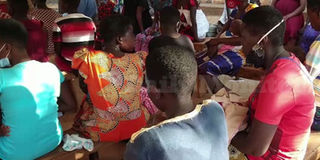Keeping girls in school reduces teen pregnancies

Some of the teenage mothers at Makonge community health center in Kiyindi landing site in Buikwe District on September 25. PHOTO/JESSICA SABANO
What you need to know:
- Police and the local leaders should strengthen the existing policies regarding child protection if the children are to remain safe
Covid-19 has caused disruptions to all the key sectors of the economy. The education sector has also been hit hard with learning institutions still closed. The continuous closure of the learning institutions has led to many vices that have resulted in teenage pregnancies, child marriages and child labour.
Even before the Covid-19 pandemic outbreak, teenage pregnancies were a public health issue. In Uganda, one in four girls aged 15-19 has a child, more than 40 percent of the teenage pregnancies are intended.
Additionally, 88 percent of the intended pregnancies occur because the adolescents have no access to contraceptives, and such inaccessibility has put their lives at a stake.
It is close to two years since government closed schools to curb the spread of Covid-19. However, it should be noted learning institutions are the most safe havens for many children.
But with many schools still under lock and key, many girls are engaging in sexual activities thus exacerbating cases of teenage pregnancies in some regions.
Some children are engaged in forced labour in order to provide financial support to their families.
This contradicts with the Employment Act, 2006 that only authorises children under the age of 14 years to perform light work under the supervision of an adult aged 18 years. Exposure to work and money is likely to stop many learners from pursuing education.
With the government scheduling the re-opening of primary schools and secondary schools to next year, there should be provision of more Covid-19 relief funds to the vulnerable persons, especially the families to look after their children.
This will enable parents to invest more in homeschooling and e-learning so that the children and their teachers can remain engaged with learning.
They should also create time for their children, especially the girls, who can be easily enticed by small things that end up ruining their future.
Parents should also monitor their children’s movements to ensure they are safe and secure. The parents should double their efforts by building rapport with their children especially the girls so that they can easily open up in case they are experiencing some hardships in attaining essential needs and care.
On the other hand, government needs to devise means of helping children from rural areas to ensure that they are not being excluded from the services being implemented and hold more sensitisation campaigns on the dangers of early marriages.
Lastly, the police and the local leaders should strengthen the existing policies regarding child protection if the children are to remain safe.
Hildah Nsimiire , Research intern, Great Lakes Institute for Strategic Studies




